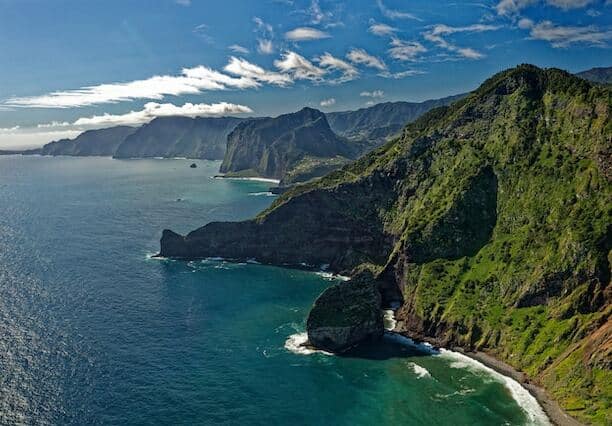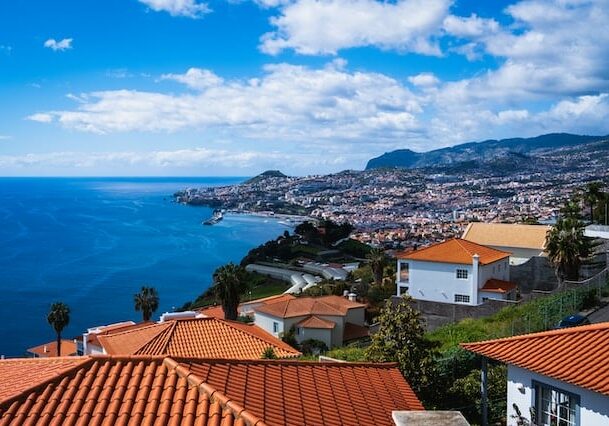Updated: February 17, 2026
Buying property in Madeira is becoming one of Portugal’s hottest opportunities. Rising rents, rapidly appreciating property values, and a strong rental market make the island ideal for investors and foreign buyers seeking steady income and long-term growth.
The Madeira real estate market is diverse, ranging from affordable country houses to luxury villas with sea views. The sunny weather, stunning beaches, and breathtaking views of the Atlantic Ocean are some of its best-selling points.
In this article on how to buy property in Madeira, we offer a step-by-step guide to the purchasing process. You can also find the latest property prices, additional costs, legal requirements, and a list of the necessary documents.
Read more about:
Key Takeaways of Buying Property in Madeira
- Foreigners can buy property in Madeira with no restrictions. To do so, you’ll need a Portuguese tax number (NIF), a promissory contract, a final deed, registration at the Land Registry, and ideally a Portuguese bank account.
- For many expats, the best places to buy property in Madeira are Funchal, Calheta, São Vicente, Santana, Machico, and Porto Moniz.
- The cost of buying property in Madeira varies based on the location. As of January 2026, the average asking price for a house in Madeira is €3,760 /m2.
- Real estate owners in Madeira pay taxes both when buying and annually. At purchase, buyers pay a property transfer tax (IMT) and a small stamp duty (0.8 percent). Afterward, owners pay an annual property tax (IMI) based on the property's tax value, often from 0.3 percent to 0.45 percent for residential homes.
Why Buy a Property in Madeira: The Island's Unique Appeal
Madeira Island has a unique charm, beautiful beaches, vibrant culture, and modern infrastructure. These coastal areas are a prime destination for holiday home buyers, investors, and expats looking to relocate permanently due to the convenient access to quality healthcare and education.
Other benefits of buying property in Madeira include:
- Lower living costs: The cost of living in Madeira is lower than in mainland Portugal. It also provides a lower entry point for property prices than the United States and many Western European countries, with strong potential for capital appreciation.
- No restrictions for property ownership: Purchasing property on the island is straightforward and accessible to foreign buyers.
- High rental income: The tourism industry is booming, making rental property in Madeira a lucrative investment.
- Great quality of life: With its sunny weather, stunning beaches, and low crime rate, Madeira Island offers a relaxed lifestyle ideal for digital nomads, retirees, and young professionals. Families with children get access to international schools in Madeira.
- Tax benefits: Investing in Madeira, Portugal, real estate offers tax benefits through the Non-Habitual Resident (NHR) 2.0 program, which attracts skilled professionals. For ten years, it provides a special 20 percent flat tax on income from specific high-value jobs in Portugal.
- Pathways to residency: Madeira real estate investment can boost your case for a visa application for the Portugal D7 Visa (Passive Income or Retirement Visa) and D2 (Entrepreneur Visa). However, purchasing property no longer qualifies for the Golden Visa.
What rental yields can you expect in Madeira?
Rental yields in Madeira stand at 4.9 percent when buying a property to rent it out. However, the total rental income depends on the location, property type, amenities, and seasonality, with some properties reaching annual yields of 8 percent.
For example, the gross rental yield in Funchal is 6.61 percent in the city center and 7.74 percent outside the center, according to Numbeo. Other top areas for rental income in Madeira are Caniço, Santa Cruz, Calheta, Ponta do Sol, and Porto Moniz.
If you would like to rent your property out in the short term, you will need to get an Alojamento Local (AL) License from your local municipality.
Property Prices in Madeira in 2026
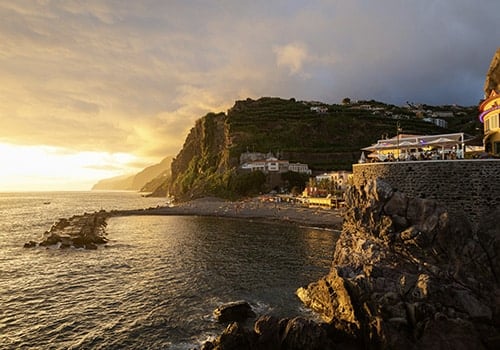
You can find relatively affordable homes for sale in Madeira, particularly in rural areas or small towns such as São Vicente and Porto Moniz.
The table below outlines the average asking price of Madeira real estate for popular locations as of January 2026.
Area | Average asking price (per m2) |
Calheta | €4,234 |
Câmara de Lobos | €2,995 |
Funchal | €3,901 |
Ponta do Sol | €3,514 |
Ribeira Brava | €3,912 |
Santa Cruz | €3,012 |
Can foreigners buy property in Madeira?
Yes, foreigners can purchase property in Madeira without restrictions. To buy property in Madeira as a foreigner, you must have a Portuguese tax number (NIF) and correct documentation. Setting up a Portuguese bank account can help you manage the transaction costs. The entire process takes about one to four months.
Is now a good time to buy property in Madeira?

Although property prices across Portugal rose by more than 17.7 percent year on year in Q3 2025, buying property in Madeira remains more affordable than in many Western European countries, based on research from Caixa Bank.
Another major advantage is the year-round tourism, making Madeira an ideal place for purchasing property with long-term capital appreciation.
In the first seven months of 2025, Madeira welcomed 1,407,400 guests, a 9.7 percent increase compared to the same time the previous year. According to DREM, the island showed more than 7.3 million total overnight stays. Coastal areas are the most sought-after locations for luxury property in Madeira, especially for holiday lets and exclusive rentals.
What are the pitfalls of buying property in Madeira?
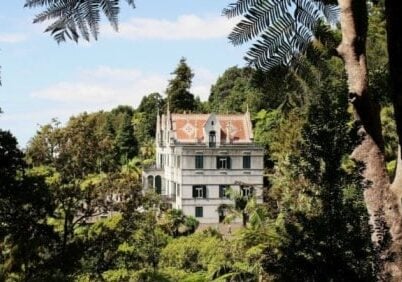
- Older properties can have hidden problems like damp, leaks, or structural damage. We suggest you get a professional survey or inspection before buying.
- Many buyers forget to budget for extra costs such as taxes, notary fees, stamp duty, and legal fees. These additional expenses can add around 7 to 10 percent or more to the purchase price.
- Most of the documents are in Portuguese. So, it’s wise to hire a translator or work with multilingual property professionals to avoid misunderstandings.
- Only use properly licensed property professionals. Check their reputation and reviews before deciding to work with them. They should have an AMI license issued by IMPIC.
- Many foreign buyers overlook the local laws about zoning, rental rules, and permits for renovations or new builds. A real estate lawyer can help explain these regulations.
- Portuguese banks typically require non-residents to make a higher down payment of 20 to 40 percent of the property’s value. This is because they generally offer a lower loan-to-value ratio for foreign buyers.
- Currency exchange rates can affect your costs if you’re buying from outside the Eurozone. To save money and reduce risk, you may want to use a specialist currency service. It is also recommended to open a Portuguese bank account to save on transaction costs.
How to find a property in Madeira?
There are multiple options to find properties for sale in Madeira. You can check online real estate databases or visit the island and compare the prices. But the most efficient way is to consult with a buyer’s agent or a real estate agent in Madeira.
A buyer’s agent works specifically for the buyer, while a real estate agent works on behalf of the seller. A buyer’s agent like Goldcrest can research the property market, negotiate prices, and provide off-market properties that suit your budget.
Best Areas to Buy Property in Madeira
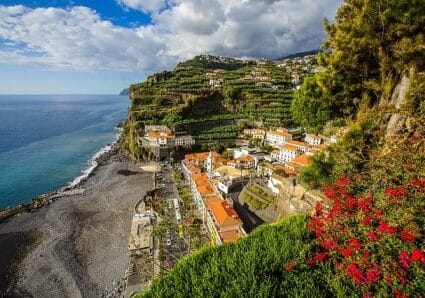
When buying property on Madeira, take into consideration the weather and accessibility. The south of the island is generally warmer, and is also where the international Funchal airport is located.
Bear in mind that the property costs listed below are just a general estimate and are subject to change.
 Funchal
Funchal
Funchal, the capital of Madeira, is a strong real estate investment with an average property price of €3,901 per square meter. It offers a vast collection of properties from modern apartments and luxury penthouses to traditional houses and commercial real estate. The more expensive properties are the newer buildings with ocean views, mainly in the city center, while cheaper options are in the older neighborhoods further from the coast. São Martinho, to the west of Funchal, also offers coastal property at more affordable prices.
 Calheta
Calheta
Calheta is an ideal location for a vacation home with stunning views, a sunny climate, and outdoor activities. Properties come at higher prices in sought-after tourist destinations, while you can find more affordable real estate options in older villages and inland hills. The average property price in Calheta is €4,234 per square meter.
 São Vicente
São Vicente
São Vicente is a more rural neighborhood for various preferences. It is an affordable investment opportunity for local and international buyers, where you can find modern apartments, rustic cottages, and Madeira houses for sale. You can buy plots of land for building or renovated villas where you can enjoy the natural beauty and stunning views of the Atlantic Ocean. The average asking price in São Vicente is €1,300 to €1,400 per square meter.
 Santana
Santana
Santana is a fantastic choice for those drawn to a quiet, more traditional lifestyle. Here, Madeira offers a wide range of properties, like cottages, rustic stone houses, and plots of land. It is an affordable neighborhood that you can use for renovation properties and to build your dream home. The average asking price in Sanata is about €1,800 per square meter.
 Machico
Machico
Machico is a small fishing town with more accessible property prices than Funchal or Calheta. You can choose between a variety of properties, such as modern apartments, traditional Madeiran homes, and some luxury villas. The older houses are significantly more affordable than those in Funchal, but often require renovation and modernization. The average property price in Machico is about €2,800 to €3,000 per square meter.
 Porto Moniz
Porto Moniz
Porto Moniz is a municipality on the northwestern tip of Madeira Island, Portugal. It is a small town known for the natural volcanic swimming pools. Properties range from traditional Madeiran houses, rustic cottages, to plots of land for building. Modern apartments, luxury villas, and detached houses are less common. Here, you can enjoy the panoramic views of the Atlantic Ocean and the lush Laurissilva Forest. The average property price in Proto Moniz is about €2,200 per square meter.
 Ponta do Sol
Ponta do Sol
Ponta do Sol has various houses in Madeira for sale with a growing digital nomad community. Most of the properties foreigners buy are luxury villas with infinity pools, which often come at higher costs. But you can also find affordable traditional houses and land for sale in the hilly areas where you can build your dream property or find a project to renovate. The average property price in Ponta do Sol is €3,514 per square meter.
 Câmara de Lobos
Câmara de Lobos
Câmara de Lobos is a traditional fishing village with easy access to Funchal. Here, you can find modern apartments, semi-detached houses, and villas. The most expensive luxury villas are in areas like Estreito de Câmara de Lobos. The average property price in Câmara de Lobos is €2,995 per square meter.
 Santa Cruz
Santa Cruz
Santa Cruz is a municipality in the eastern part of this Portuguese archipelago. It is home to Madeira’s main airport, which makes it an entry point for all visitors to the island. Here, you can find high-quality apartments, modern villas, traditional houses, and many plots of land available for construction. The average property price in Santa Cruz is €3,012 per square meter.
 Ribeira Brava
Ribeira Brava
Ribeira Brava is a municipality of Madeira Island on the southern coast. While not as expensive as Funchal or Calheta, prices are higher than those on the more rural north coast. You can find a variety of properties, from apartments in the town center to traditional houses and villas on the surrounding hillsides with fantastic sea views. The average property price in Ribeira Brava is € 3,912 per square meter.
What are the requirements for buying a property in Madeira?
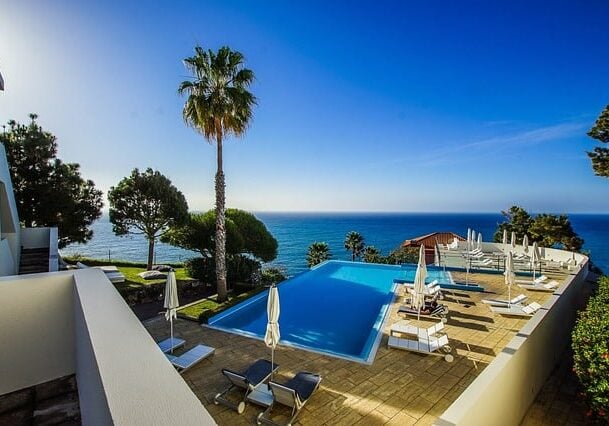
So, what are the requirements? Foreign buyers must have:
- A NIF (Número de Identificação Fiscal). You need a NIF to carry out any financial or legal transaction, such as buying property in Portugal, signing the final deed, or opening a bank account. You can apply for a NIF in person at a local tax office (Finanças) or have a real estate lawyer apply on your behalf. Our residency and citizenship division, Global Citizen Solutions, can also help you get a NIF remotely. If you are a non-EU citizen, you will need to have a tax representative in Portugal to complete this process.
- Opening a Portuguese bank account: You should open a local bank account to transfer funds for the property purchase, make the initial deposit, and handle recurring costs like taxes, utilities, and mortgage payments.
- Legal representative: Although it isn’t mandatory, it’s highly recommended to hire a Portuguese real estate lawyer. They can conduct due diligence on the property you plan to buy and ensure it is free of debts, alongside warning you of any zoning considerations. They can verify the legal status and property ownership in Portugal.
The Step-by-Step Process of Buying Property in Madeira
Here is a step-by-step guide for the process of buying property in Portugal:
Step 1: Obtain a Portuguese tax number (NIF)
Request your NIF (tax identification number) at a Portuguese tax office (Finanças) or through a tax representative. We also recommend opening a bank account in Portugal to save on transaction costs.
Step 2: Engage a real estate lawyer
Consult with a property lawyer in Madeira to comply with Portuguese law. Legal experts can evaluate disclosures, title searches for liens, and zoning laws.
Step 3: Property search and offer
You can use a buyer’s agent or a property finder in Portugal to search the Madeira real estate market.
Step 4: Conducting due diligence
Have a professional inspect the real estate and provide a roof inspection and property survey.
Step 5: Signing the CPCV
Sign the Promissory Contract (CPCV) with a 10 to 20 percent initial deposit. The CPCV, also known as Contrato de Promessa de Compra e Venda, reserves the property.
Step 6: Signing the final deed and completing the purchase
Visit the local notary’s office to pay the final balance and sign the final deed of sale (Escritura Pública).
How much tax do I pay when buying a property in Madeira?
When it comes to buying properties in Madeira, you will need to be aware of your tax obligations, which you will need to pay at the time of purchase and on an annual basis. There are also additional costs like lawyer and Notary fees to factor in.
 Property purchase taxes
Property purchase taxes
When you buy property in Madeira, you pay a one‑off property transfer tax (IMT) and stamp duty (Imposto do Selo) at closing. The stamp duty is fixed at 0.8 percent of the purchase price. The IMT rates are progressive for a residential property that you use as a permanent home. However, the IMT rates vary depending on whether it is a primary residence, secondary home, or investment property.
Here are the IMT rates for urban properties designed as a permanent residence:
Property Value (€) | Marginal Rate (%) | Average Rate (%) |
Up to 106,346 | 0 | 0 |
106,346 to 145,470 | 2 | 0.5379 |
145,470 to 198,347 | 5 | 1.7274 |
198,347 to 330,539 | 7 | 3.8361 |
330,539 to 660,982 | 8 | - |
660,982 to 1,150,853 | 6 (single rate) | - |
Over 1,150,853 | 7.5 (single rate) | - |
Source: PWC Portugal
 Other purchase fees
Other purchase fees
In addition to property taxes and the purchase price, you will need to budget for the following fees and costs at the time of your property purchase:
- Legal fees: €2,000-€5,000
- Land Registry fee: €250
- Notary fees: €500-€1,000
 Ongoing property taxes and costs
Ongoing property taxes and costs
The ongoing property taxes and costs to budget for include:
- IMI (Imposto Municipal sobre Imóveis – Annual Municipal Property Tax): This annual tax is levied on the Property Tax Value (VPT) and not the property price paid upon purchase. For urban properties, the IMI rate ranges from 0.3 to 0.45 percent of the VPT, which can increase to 0.5 percent in some instances. The IMI rate applied to rustic buildings is 0.8 percent.
- Condominium fees (if applicable for apartments)
- Utilities, such as water, electricity, and internet
- Home insurance
How to finance your property purchase in Madeira?
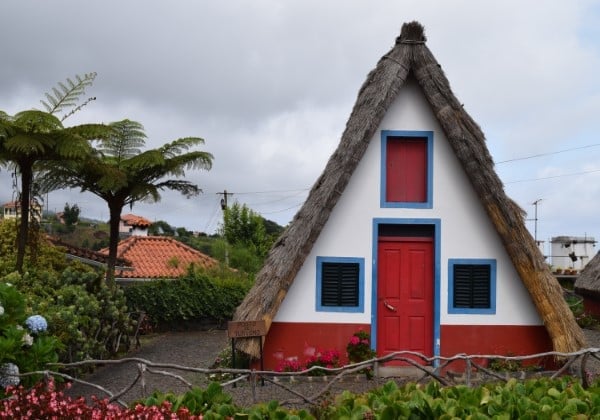
Banks in Portugal typically offer loans of 65-75 percent of the property’s value or its sale price, whichever is lower. Fiscal residents in Madeira can borrow up to 85-90 percent of the sale price in most cases.
As a fiscal resident purchasing your primary residence, you will be required to provide a minimum deposit of 10 percent of the value of the property or the sale price. A mortgage for a second property often needs at least a 20 percent deposit. Non-residents and foreign investors often need a down payment of 20 to 30 percent.
For more information, check our guide on mortgage in Portugal for foreigners.
Goldcrest: How We Can Help You
Goldcrest is a buyer’s agent that is based in Lisbon. We provide expert, impartial advice on real estate investments and how to buy property in Portugal. From scouting out the perfect property through to property acquisition, we have you covered throughout the process.
If you are looking to purchase property in Portugal, don’t hesitate to get in touch. Our team of skilled experts is available to solve all your real estate doubts, helping you with the property search and offering insightful expertise and strategic advice.
Why choose Goldcrest?
- Local knowledge: With offices located across Portugal, our presence nationwide allows us to assist you personally across the country.
- Independent service: As an independent buying agent, we do not represent any development or project. Our service is entirely tailored toward each individual client, providing you with everything you need to secure the perfect property at the best possible price. As an impartial advisor on the market, we work solely on behalf of our client and provide a service tailored to your needs and requirements.
- Streamlined process: Our real estate agents speak English and Portuguese, and our service is completely focused on providing you with a hassle-free buying experience, saving you time.
- Experienced team: Our expert real estate team has a vast local knowledge of the Portuguese property market. We have cutting-edge technology and metasearch tools at your disposal to provide full market coverage, ensuring the best investment choices and negotiated prices.
- Network of partners: We have a close network of partners, including lawyers, property management services, builders, architects, designers, and landscape gardeners, again saving you time and hassle by providing you with trusted experts in their field of work.
Frequently Asked Questions about Buying Property in Madeira
Can US citizens buy property in Madeira?
Yes, there are no restrictions on US citizens buying real estate in Madeira. You will need to have a NIF number, and it is recommended to open a Portuguese bank account to save on transaction fees. You will still need to secure a residence visa in Portugal to live in Madeira long-term.
Is Madeira a good place to buy property?
Yes, the Madeira Island is a great place to buy property. The real estate market in the Portuguese archipelago offers strong appreciation, stable rental yields, and a high quality of life. Foreigners are drawn to the natural beauty and the year-round tourism market.
Do I need to be in Madeira to buy a property?
No, you don’t have to be physically on Madeira Island to buy property. You can complete the purchasing process remotely with a lawyer or representative with a power of attorney. They can offer advice on Portuguese law, sign the documents for you, open a bank account, and handle the legal processes.
What is the average price of a house in Madeira?
Average property prices in Madeira are €3,760 per square meter in January 2026.
Can I buy property to live in Madeira permanently?
Owning property in Madeira doesn’t make you a permanent resident. To stay long-term, you’ll need a residency visa. EU citizens can live without a visa for up to 90 days, but must register to stay longer. While non-EU buyers can apply for a residency permit via the D7 Visa, the D8 Digital Nomad Visa, or the Portugal Golden Visa.
